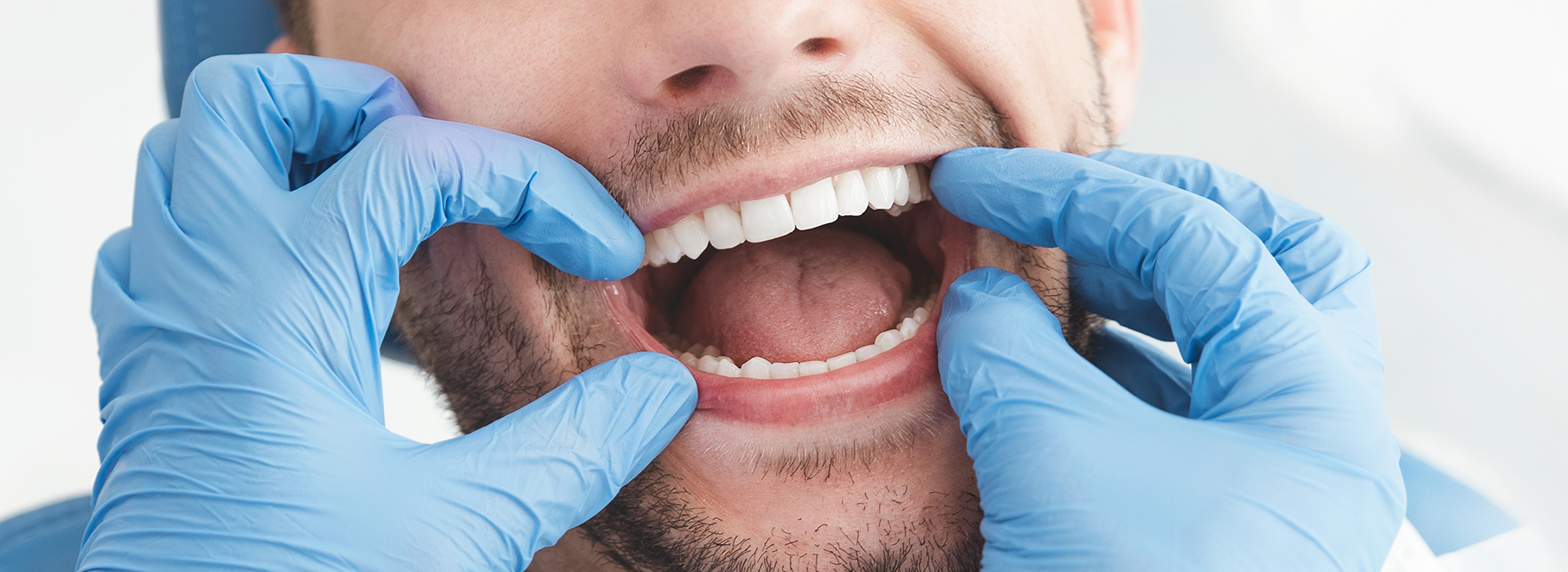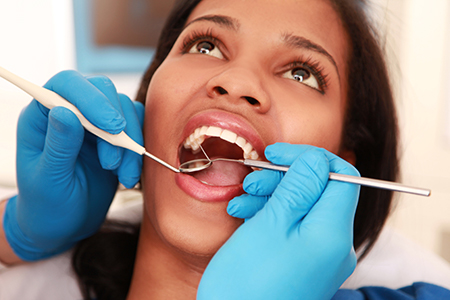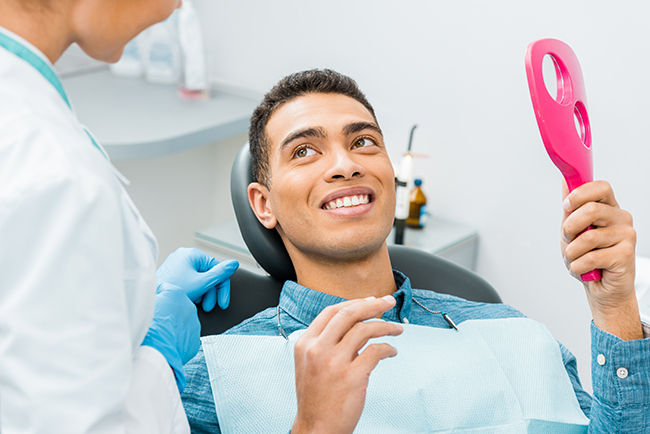
At the office of Fay Hu General Dentistry, we take a preventive-first approach to oral care because the best outcomes begin with early detection. Regular oral exams are more than a quick look inside the mouth — they are a structured evaluation that uncovers issues before they become complex. During an exam we combine careful observation, up-to-date diagnostic imaging, and a conversation about your health history so we can form a complete picture of your oral condition and overall risk factors.
Our examinations are designed to be efficient and thorough. We evaluate teeth, gums, jaw joints, soft tissues, and the surrounding structures, paying attention to any signs that indicate wear, infection, or developmental concerns. In addition to checking for cavities and gum disease, we screen for oral lesions and look for early indicators of problems that affect comfort, chewing, speech, and appearance. Patient education is an integral part of every visit — we explain findings in plain language and outline sensible next steps.
When an exam suggests further investigation, we use targeted diagnostic tools and tailor recommendations to each patient's needs. Whether you are visiting for a routine checkup or returning after a gap in care, our goal is to deliver clear information and a practical plan that helps you maintain a healthy, functional smile for years to come.

Your first comprehensive visit is the foundation of future care. We begin with a concise review of your medical and dental history so we understand medications, past procedures, allergies, and any conditions that influence oral health. This background also helps us identify risk factors — for example, certain medications and systemic conditions can increase the likelihood of dry mouth or gum inflammation.
The clinical portion of the exam includes a detailed inspection of each tooth and the surrounding tissues. We assess the gums for pockets, recession, or inflammation and examine the bite to see how teeth meet and wear over time. The temporomandibular joints (TMJ) are evaluated for range of motion and signs of strain or dysfunction. If bruxism (clenching or grinding) is suspected, we discuss symptoms and potential protective measures.
Diagnostic imaging is recommended selectively based on what we observe and your individual history. These images help us see areas that are not visible during a visual exam, such as between teeth or under restorative work. After reviewing findings, we share a clear summary of what we found and present options for preventive care, routine maintenance, or any restorative treatment that may be advised. Our aim is to equip you with straightforward information so you can make informed decisions about your care.
Oral health doesn’t exist in isolation. The mouth is a mirror of overall health, and many systemic conditions can show early signs in the oral cavity. During each exam we look for indicators that warrant further attention, such as unexplained gum inflammation, persistent ulcers, or changes in saliva that could suggest broader medical concerns.
Contemporary research highlights meaningful associations between oral conditions and several systemic diseases. For example, chronic gum disease has been linked to heightened inflammatory responses that may influence cardiovascular health, and dry mouth can be both a symptom and a contributor to broader health problems. While oral disease is rarely the sole cause of a systemic illness, identifying and managing oral conditions can reduce local symptoms and support general well-being.
We also pay attention to oral signs that may reflect medication effects, nutritional deficiencies, or autoimmune conditions. When appropriate, we coordinate with your medical providers to ensure a cohesive approach to care. Early recognition and timely referral are important parts of preventing escalation of both oral and systemic issues.

Routine checkups paired with professional cleanings form the backbone of preventive dentistry. Even the most diligent home-care routine can miss small areas where plaque hardens into calculus; a professional cleaning removes those deposits and reduces the bacterial load that leads to cavities and gum disease. Cleanings also remove surface stains, leaving the mouth feeling fresher and cleaner.
How often you need a visit depends on your individual risk profile. Many patients benefit from twice-yearly visits, but those with active gum disease, a history of rapid decay, or certain medical conditions may require more frequent monitoring. During each hygiene visit we evaluate technique, recommend adjustments, and demonstrate tools or products that can improve home care efficiency.
For children and adolescents, routine exams are also an opportunity to monitor growth and tooth development. Early detection of alignment issues allows for timely orthodontic consultation when indicated. By establishing consistent dental visits from a young age, we help families form habits that preserve oral health as children grow into adulthood.
Patient education is a central part of the cleaning appointment. We tailor instruction on brushing, interdental cleaning, and other preventive strategies to each person’s needs so that home care complements in-office maintenance.
Imaging complements the visual exam by revealing what lies beneath the surface. Dental radiographs allow us to identify cavities between teeth, assess the health of tooth roots and surrounding bone, and locate hidden sources of infection. Modern digital imaging provides these insights with far less exposure to radiation than older film-based systems.
Digital radiography offers practical advantages for patients and clinicians alike. Images are available immediately, which speeds diagnosis and consultation. They can be enlarged and enhanced to clarify subtle findings, and they integrate seamlessly with electronic records for long-term tracking. When necessary, images can be securely shared with specialists to support collaborative treatment planning.
We approach imaging conservatively and use the appropriate type and frequency for each patient's situation. Our goal is to gather the information needed to make accurate, minimally invasive treatment decisions while following recommended safety practices.

Different images answer different clinical questions. Periapical radiographs focus on a single tooth from crown to root tip and are useful for assessing root health, detecting abscesses, or evaluating restorative margins. Bitewing images capture the crowns of back teeth and are especially valuable for spotting early decay between teeth where visual inspection is limited.
A full-mouth series combines multiple periapical and bitewing views to give a comprehensive baseline of all teeth and their supporting bone. Panoramic films (panorex) provide a broad 2D overview of the jaws, erupted and developing teeth, and the general condition of the jawbone — they are frequently used for initial assessments and to visualize impacted or developing teeth.
Cephalometric films produce a profile view of the facial skeleton and are commonly used in orthodontic planning to evaluate skeletal relationships and growth patterns. For complex surgical planning and precise implant placement, cone-beam computed tomography (CBCT) provides three-dimensional imaging that reveals bone quality, nerve locations, and anatomical variations with exceptional detail.
Each imaging option has specific strengths and limitations; we select tools based on clinical need, balancing the desire for diagnostic clarity with a commitment to patient safety. When advanced imaging is suggested, we explain why it is beneficial and how it will influence care decisions.
Regular oral exams are an efficient, evidence-based way to protect oral health and catch problems early. If you'd like to learn more about how an exam can support your dental goals or to discuss which screening and imaging options are best for you, contact the office of Fay Hu General Dentistry for more information.

Yes. We always welcome new patients and their families for care. Feel free to give us a call or reach out to us online to schedule a first visit or for any additional information on our office. We look forward to hearing from you!
Routine dental checkups and professional cleanings help ensure your smile remains in tip-top condition and that any developing problems receive the prompt care they require. While it's a good idea to schedule a checkup and cleaning twice a year, longer or shorter intervals between routine visits depend on your specific needs.
We understand that life gets complicated and busy, and for various reasons, you haven't been able to get to the dentist for care. Don't worry; it's always a good time to get back in touch with the health of your smile.
At Fay Hu General Dentistry, we offer skilled and compassionate care to address a wide range of dental needs. Whether you need a simple checkup and cleaning, restorations, periodontal treatment, root canal therapy, or the replacement of missing teeth to get your smile back into shape, we provide precise, gentle, stress-free treatment to give you a smile that is as beautiful as it is healthy.
Give us a call today; we're happy to address all your questions and concerns about getting your smile back in tip-top condition.
For pregnant women, practicing good oral care and seeing the dentist to maintain a healthy smile is considered an important component of prenatal care. Researchers have found that pregnancy not only increases the risk of oral health problems, but these problems may also lead to pregnancy complications. At the office of Fay Hu General Dentistry, we provide the skilled and compassionate care required to help expectant mothers keep their teeth and gums in tip-top condition. While certain procedures are not recommended during pregnancy, we provide the necessary care and take all the necessary precautions required.
Thanks to advances in modern dentistry, teeth that have been affected by a range of imperfections or that have sustained damage from trauma or dental decay can be restored to produce a naturally beautiful looking and functional smile.
As skilled and experienced providers of care, our office can effectively improve and enhance the appearance of teeth that are stained, discolored, misshapen, chipped, fractured, gapped, crowded, or broken down due to dental decay. At the office of Fay Hu General Dentistry, we offer a comprehensive selection of the leading-edge cosmetic solutions from teeth whitening procedures, dental bonding, tooth-colored fillings, and veneers, to prosthetic solutions and dental implants to rebuild complete and beautiful smiles.
Contact our office to learn more about the many ways we can help you create the smile you've always wanted.
If you're visiting Fay Hu General Dentistry for the first time, it is helpful that you contact your former dental office and have your records sent over to us. Make note of any problems you may have so that you can discuss them with your dentist.
To provide efficient service, we ask you to please bring your insurance card, an ID, plus any referral slips or diagnostic records given to you by another office. If you are taking medications, please note or make a list of what they are as you will need to provide that information.
Yes! We assure you that both you and your family will be in good hands at the office of Fay Hu General Dentistry.
We do our best to make sure every patient who steps into our office for care is put at ease. We provide precise and gentle care and our skilled, compassionate team strives to make every visit stress-free. You can rest assured that your smile is in the best of hands and that we are doing all we can to ensure your comfort throughout every procedure. While we always take the time to explain every step in care, feel free to ask us any questions about local anesthesia and methods of dental sedation.
At the office of Fay Hu General Dentistry, we strive to provide the highest quality of care to address all your dental needs. Once we've had the opportunity to examine your smile, we can give you a clear picture of any dental issues that are present, along with a quote for what the cost of treatment will be. The cost of care all depends upon the extent and complexity of issues affecting the health or appearance of your smile and the types of procedures that are required. Our goal is to make dental care more affordable so that you can begin treatment without any additional stress or delay.
Keep in mind that with routine dental checkups and periodic care, we can help prevent dental disease while treating emerging problems early in their onset to avoid larger issues and more expensive care down the road.
Routine dental checkups and preventive care procedures may be covered under your dental insurance plan requiring little to no out-of-pocket expense. We invite you to check our financial information page or give us a call to find out if our office participates with your plan, and if you have any other questions about dental insurance, dental savings plans, forms of payment, or financing options. We welcome your inquiries and do our best to help you begin care without additional stress or delay.
If you've lost a tooth due to injury, decay, gum disease, or any other reason, we recommend dental implants to replace missing teeth. Dental implants come the closest to replicating the look, feel, and function of your natural teeth.
Absolutely! Both flossing and brushing regularly are equally important to maintain your oral health. While brushing cleans the surface of your teeth, flossing cleans in between them. Flossing is important to prevent plaque buildup, which can cause gums to recede and lead to periodontal disease.
Even if you have dentures, it is still necessary to see a dentist! Dental checkups help ensure that your dentures are comfortable, fitting properly, and that there are no other problems. Beyond assessing your dentures, our dentist will also perform a thorough examination of the jawbone, and surrounding soft tissues both inside the mouth, the face, and neck, to confirm that you remain in good oral health.
Emergency dental care is a service we hope you'll never need- but if you do, the office of Fay Hu General Dentistry is here for you!
Whether you're suffering from a chipped tooth, toothache, or any problem affecting your oral health, you can be sure to get the prompt attention and compassionate care you require at our office. Patient care and comfort are our top priorities, and we offer a comprehensive range of the most advanced services to address a broad spectrum of dental needs.
While the pain of a toothache is one of the more common reasons that patients come to our office for emergency dental care, we also promptly treat emergencies that are not necessarily painful like crowns that have been dislodged and broken dentures that leave embarrassing gaps in one's smile.
You can rest assured that your oral health is in the best of hands at our office. We'll quickly determine exactly what's wrong, explain your treatment options, and then provide the precise and gentle care you require to alleviate your discomfort and get you back on the path to oral health and wellness.
Your health and comfort are our top priorities. If your dental emergency is painful, if it affects the appearance of your smile, or if you suspect that an infection is present, our office will make every effort to see you as soon as possible for care.
At the office of Fay Hu General Dentistry, we welcome patients of all ages for care and offer a comprehensive range of services designed to help every member of your family maintain a beautiful and healthy smile. Whether you or a loved one needs a routine checkup and cleaning, fillings, same-day crowns, a cosmetic smile makeover, the replacement of missing teeth or require the services of a skilled and compassionate emergency dentist, you can rely on our office for the highest quality care.
For more information on our office and the many services we provide, or to schedule an appointment for care, give us a call today.
An oral exam is a professional evaluation of the teeth, gums, jaws and surrounding tissues that helps detect problems early. It combines a visual inspection, gentle probing and assessment of bite, jaw movement and soft tissues to identify signs of decay, gum disease, wear or other abnormalities. Early detection through routine exams makes many conditions easier to treat and helps preserve long-term oral function and appearance.
Regular oral exams also include screening for oral cancer and other lesions that may not cause obvious symptoms in early stages. Detecting these issues sooner increases the chances of successful treatment and can reduce the impact on overall health. An exam also gives clinicians the opportunity to review medications, habits and systemic conditions that affect oral health so care can be personalized.
Your first checkup visit establishes a baseline record of dental and medical history and gives the dental team a chance to learn about your concerns and goals. The visit typically begins with a review of your health history, a discussion of current symptoms or sensitivities, and documentation of medications and allergies. This information helps the clinician identify risk factors that influence exam findings and follow-up recommendations.
After the history, the clinical portion of the appointment includes a thorough visual exam, a periodontal evaluation and an assessment of bite and jaw function. Diagnostic images such as digital x-rays are taken when indicated to reveal issues below the surface, and the dentist will explain findings and outline any recommended next steps. The visit concludes with practical advice about home care and any short-term preventive steps you can take.
For many patients, scheduling an exam and professional cleaning every six months is a good starting point because this interval helps control plaque and catch changes early. However, the ideal frequency depends on individual risk factors such as gum disease, a history of cavities, dry mouth, smoking or certain medical conditions. People with elevated risk may need more frequent visits, while very low-risk individuals could be seen at slightly longer intervals as determined by the dentist.
During each visit your clinician will reassess risk and adjust the recall schedule as needed to support long-term oral health. Consistent professional care combined with effective home hygiene reduces the likelihood of emergency visits and more extensive treatment. Your personalized schedule is designed to prevent disease progression and to maintain the results achieved through treatment.
An oral cancer screening is a systematic inspection of the lips, tongue, cheeks, floor of the mouth, throat and the tissues of the head and neck for unusual lumps, red or white patches, ulcers or other suspicious signs. The clinician will palpate tissues to check for firmness or irregularities and ask about symptoms such as persistent soreness, numbness or changes in swallowing. The process is quick, noninvasive and performed as part of a comprehensive oral exam.
If the exam reveals a suspicious area, the dentist may monitor it closely, recommend additional diagnostic testing or refer the patient to a specialist for biopsy and evaluation. Patients with risk factors such as tobacco use, heavy alcohol consumption, HPV exposure or a history of chronic irritation may receive more frequent screenings. Early detection remains the most effective way to improve outcomes for oral and oropharyngeal cancers.
Dental x-rays provide a view of the structures that cannot be seen during a visual exam, including the roots of teeth, the supporting bone and areas between teeth where decay often begins. Modern digital radiography minimizes radiation exposure while delivering high-resolution images that can be viewed immediately. These images help clinicians detect decay, assess bone levels, identify impacted or developing teeth and plan restorative or surgical procedures safely.
Different x-ray types serve different clinical needs, such as bitewings for detecting interproximal decay, periapicals for individual tooth assessment, panoramic films for an overall view of the jaws and CBCT scans for three-dimensional analysis when advanced imaging is required. The dentist recommends the most appropriate imaging based on the reason for the visit and the patient’s history. Digital images can be stored and compared over time to monitor changes and treatment outcomes.
Oral exams for children focus on growth, development and preventive care while remaining age-appropriate and educational. The clinician evaluates tooth eruption, bite development and jaw growth, screens for early signs of decay and checks for habits such as thumb-sucking or mouth breathing that can affect development. The appointment often includes guidance on diet, fluoride use and home hygiene tailored to the child’s stage of dental development.
Because early intervention can reduce the need for more extensive treatment later, pediatric exams also include monitoring for potential orthodontic issues and timing for sealants or fluoride applications when appropriate. Establishing a positive, routine relationship with dental care helps children develop lifelong habits and reduces anxiety around visits. Parents receive clear instructions and coaching to support oral health between appointments.
The mouth commonly reflects overall health, and many systemic conditions cause measurable changes in oral tissues before other symptoms appear. For example, uncontrolled diabetes may present with increased gum inflammation or infection, nutritional deficiencies can cause mucosal changes or ulcerations, and autoimmune conditions may cause dry mouth or persistent lesions. By observing these signs during an exam, the clinician can recommend further medical evaluation when appropriate.
Dental professionals document findings and, when indicated, communicate with a patient’s medical provider to coordinate care and support diagnosis. Accurate reporting of medications, medical conditions and recent changes in health is essential because systemic factors often influence dental treatment decisions. Early recognition of oral manifestations can therefore speed diagnosis and improve overall health outcomes.
A periodontal evaluation assesses the health of the gums and the supporting structures around the teeth, including measurement of pocket depths, checking for bleeding on probing and evaluating gum recession and bone support. These measurements help determine whether gingivitis or periodontitis is present and the extent of tissue involvement. Identifying periodontal disease early allows the dental team to recommend appropriate therapies to halt progression and preserve tooth support.
Periodontal health also affects treatment planning for restorations and implants, and it influences the recommended frequency of maintenance visits. Because gum disease has been associated with systemic conditions, managing periodontal inflammation is an important component of comprehensive care. Ongoing periodontal maintenance and patient education in effective home care are key to long-term success.
To prepare for an oral exam, bring a list of current medications, any recent medical records or x-rays and a summary of symptoms or concerns you want to discuss with the dentist. Maintain your regular oral hygiene routine in the days before the visit and note any changes in comfort, taste, swallowing or oral sensations so you can describe them accurately. If you have anxiety about dental visits, let the office know in advance so the team can discuss comfort options and expectations.
Arrive a few minutes early to complete or update health forms and to ensure the clinical team has time to review your records. Ask questions about imaging, fluoride, sealants or any preventive measures you are considering so the dentist can include them in the exam discussion. Clear communication helps the clinician tailor the visit to your needs and maximizes the value of the appointment.
You should seek an urgent oral exam if you experience sudden severe pain, swelling that interferes with breathing or swallowing, uncontrolled bleeding, trauma to the teeth or jaw, or signs of spreading infection such as fever and facial swelling. These symptoms can indicate conditions that require prompt professional evaluation to prevent complications. Early assessment allows the dental team to manage pain, control infection and preserve oral structures when possible.
If you encounter any of these symptoms, contact the office of Fay Hu General Dentistry promptly so the team can triage your situation and advise on next steps. For issues that are uncomfortable but not emergent, the office can often schedule an earlier-than-usual appointment to address the problem before it progresses. Timely attention reduces the chance of more extensive treatment down the road and supports better outcomes.

We are dedicated to providing the highest quality of dental care to our patients.
Through excellence in dentistry and quality in relationships, we strive to positively impact your oral health, aesthetics, and self-esteem. From the front desk to the treatment room, our experienced team is here to support you with expert care and genuine compassion.